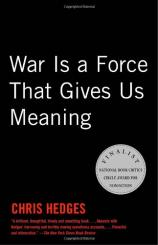Reading Group Guide
Discussion Questions
War Is a Force That Gives Us Meaning

1. War Is a Force That Gives Us Meaning seems, at first, like a misleading title. In what ways is it an appropriate title for the book? Why might Chris Hedges have chosen it?
2. In his introduction, Hedges makes the startling suggestion that "the rush of battle is a potent and often lethal addiction, for war is a drug, one I ingested for many years" [p. 3]. How does Hedges support this claim? In what sense is war "a drug"? Who are its peddlers? How could something so horrific exert such power over so many people?
3. Hedges believes that "the only antidote to ward off self-destruction and the indiscriminate use of force is humility and, ultimately, compassion" [p. 17]. In what ways has America moved away from these virtues in the past decade? How can humility and compassion, individually and collectively, restrain nations from going to war? Why is it so difficult, and so important, to feel compassion for one's enemies? What memorable examples of compassion does the book provide?
4. What distinctions does Hedges make between sensory and mythic accounts of war? What reality does the myth of war conceal? Why are such myths necessary?
5. Hedges argues that "the nationalist virus" in the former Yugoslavia "was the logical outcome of the destruction of the country's educational system that began in the 1950s under Tito's rule" [p. 56]. What role did this nationalism play in the war that followed? How does nationalism distort and manipulate history? How might an independent and more objective educational system have prevented the war?
6. What is the relationship between sexual perver-sion and war, eroticism and death? Why, in Hedges' view, does war seem to unleash the basest forms of lust? How does war affect the way the body is perceived and valued?
7. Hedges writes that, after every war, "some struggle to tell us how the ego and vanity of commanders leads to the waste of lives and needless death, how they too became tainted, but the witnesses are soon ignored" [p. 115]. Why do citizens of post-war nations prefer not to listen to such accounts? Why is it important that they be heard? In what ways is Hedges' own book just such an act of witnessing?
8. What role does the press usually play in wartime? Why does Hedges believe that in the Gulf War, the press "wanted to be used" by the military? What role should the press play?
9. In his introduction, Hedges writes that the deadly attraction of war is that "even with its destruction and carnage it can give us what we long for in life. It can give us purpose, meaning, a reason for living" [p. 3]. At the end of the book, he writes that love "alone gives us meaning that endures" [p. 184–85]. How can we ensure that love, rather than war, remains the force that gives meaning to our lives?
10. What do Hedges's frequent references to Homer, Cicero, Shakespeare, and other classical writers add to the book? Why does he take such pains to place more recent wars in the historical context provided by such writers?
11. How does Hedges's own experience—the violence he has witnessed in El Salvador, Bosnia, Iraq, and elsewhere—lend weight to his arguments? What are the most compelling examples he offers to support his views? Do Hedges's firsthand accounts make him a more trustworthy critic of war than those who have never been in battle?
12. In what ways is War Is a Force That Gives Us Meaning relevant to the tensions between the United States and Iraq, and to other conflicts around the world today? Does the book offer new and more hopeful ways of thinking about war and peace?
War Is a Force That Gives Us Meaning
- Publication Date: June 10, 2003
- Paperback: 224 pages
- Publisher: Anchor
- ISBN-10: 1400034639
- ISBN-13: 9781400034635







